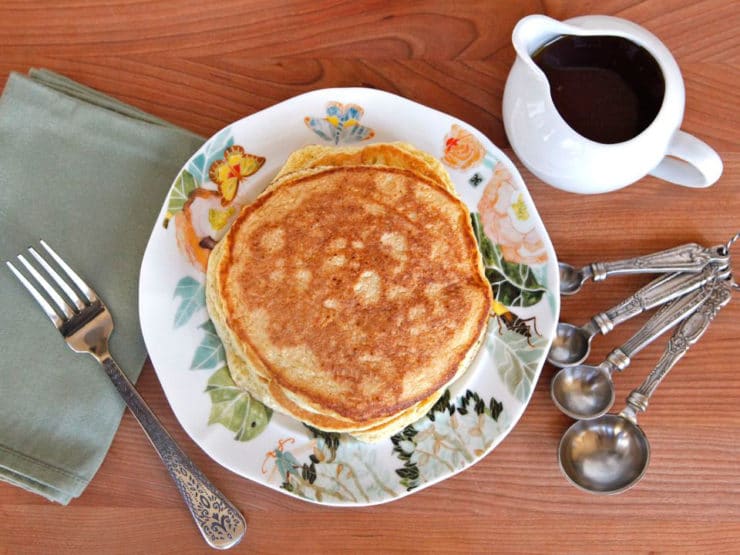
I have rephotographed and reposted this recipe from my archives for the upcoming Passover holiday.
How cute is this recipe? Even the name is cute. “Bubaleh.”
My friend Etti Hadar shared this simple Passover recipe with me. Bubaleh is made with just four ingredients – matzo meal, egg, sugar and baking powder (plus a little oil for greasing the pan). It couldn’t be easier. Each batch makes one large bubaleh. It’s like a fluffy, eggy, chametz-free version of a pancake. Serve it on a pretty floral plate, and you’ve got a certifiably adorable breakfast, brunch, brinner or snack – especially when served alongside a dish of my world famous scrambled eggs.
Curious about how baking powder could be kosher for Passover? This issue has been discussed at length on kosher websites across the web. Baking powder is mineral based, not grain based, and therefore it does not fall under the banner of “chametz,” the group of foods that are banned for Passover. There are, in fact, several brands of kosher for Passover baking powder. Some choose not to use baking powder because they feel it does not fit the “spirit” of the Passover holiday. Others have no problem using baking powder, as long as it has a kosher hechsher. Suffice it to say, the choice to use baking powder is a matter of tradition and preference. If you’re not comfortable using baking powder during the holiday, save this recipe to use up your leftover matzo meal after the Passover week is finished.
Top your bubaleh with maple syrup, like a traditional pancake, or get creative with your toppings. My friend Beth likes hers with Passover powdered sugar or sour cream. Sweet jam or fruit toppings like strawberry would be lovely, too. So cute, so yummy… what’s not to love?
Recommended Products:
We are a participant in the Amazon Services LLC Associates Program, an affiliate advertising program designed to provide a means for us to earn fees by linking to Amazon.com and affiliated sites. As an Amazon Associate I earn from qualifying purchases.
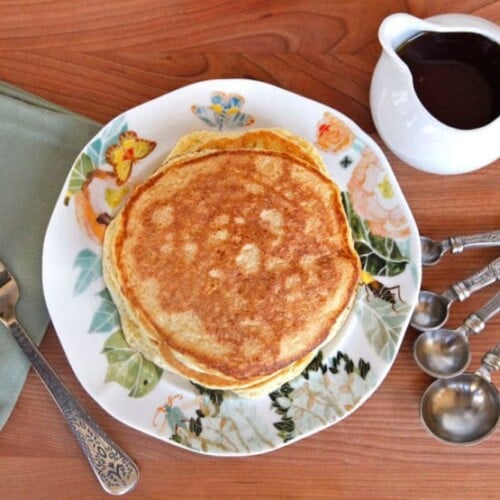
Bubaleh
Ingredients
- 1 large egg
- 1 tablespoon matzo meal
- 1 teaspoon sugar
- 1/2 teaspoon baking powder (for Passover use a kosher for Passover-certified brand)
- Nonstick cooking oil spray or vegetable oil to grease the pan
NOTES
Instructions
- In a small bowl, whisk together the matzo meal, egg, sugar and baking powder until a yellow batter forms. Make sure the ingredients are well mixed.

- Lightly grease a nonstick skillet; I recommend a medium or large skillet because the bubaleh will be easier to turn. Heat over medium till a drop of water sizzles on the surface. Pour the batter onto the hot skillet, forming a large circular pancake.Let the bubeleh cook for about 2 minutes till bubbles rise and pop on the surface of the batter and the bottom is golden brown. Flip the bubaleh and continue cooking for another 2 minutes or so, till the bubaleh is cooked through and golden on both sides.

- Serve with your choice of toppings-- maple syrup, KFP powdered sugar, butter, sour cream, or jam. Dairy toppings will make the dish dairy instead of parve.

Nutrition

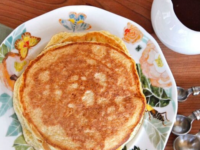
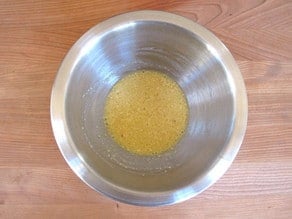
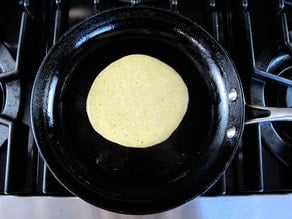
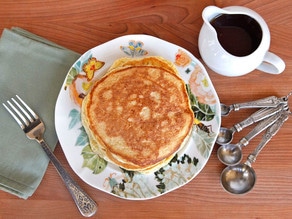


Bubelach made in my parents’ kitchen were like Myriam and Yosele’s. Light as a feather and absolutely marvelous. Only difference? They were made with mashed potatoes, no matzo meal at all.
My mother, her mother and her mother before her definitely separated the eggs and beat the egg whites. My mother added a little sweet Passover wine and some powdered ginger. YOWZER!!!
My Polish ancestors also separated the whites and beat them almost stiff. You don’t need baking powder if you do this. Then carefully fold in the matzoh meal, egg and sugar mixture and place the batter in bubbling butter. The only tricky part is turning it. Made with double the ingredients, it easily serves two. They sprinkled powdered sugar on it.
Yes, that’s the way my mom made the Bubeleh.
She cut wedges for my sister and me to eat.
Sprinkled sugar on top.
Yummy
My Mom always separated the yolks from the whites and beat the whites until almost stiff, but not dry. She then folded the egg yolk mixture into the egg whites very gently and then fried them in smaller sized little “poufs”. We ate these with a sprinkling of sugar and cinnamon.
So I need more info because I miss this and want to try… You beat how many eggs to white ? Do you use the yolks? Any other ingredients?
Thanks
Ed
Hi, Les! They are definitely worth the try, as you know, and even if less than “perfect,” they are usually delish. Folding in egg whites means that you first separate the eggs, then take the whites and whip them into stiff peaks (should not drip out or move if you were to turn the container you mixed them in upside down. Personally, I don’t always do the best job with that, but it’s still all good. Folding the egg whites into the batter means you do so gingerly; I’d use a spatula and slowly and gently add a little at a time into the mixture and, again, gently blend into it until all of the egg whites have been added.
I’ll bet you never figured you would have a goy reviewing this recipe! lol
My wife was Jewish and died some time ago. I have had a yen for “bubbaleh” for some years, but did not have the nerve to try. Bit intimidating since her’s were so good. I note that some of your reviewers have talked about no baking powder and “folding-in egg whites”. (I have no clue what that means.) Your recipe seems doable and a real good place for me to start. Thank you!
someone above mentioned using matzo cake meal instead of matzo meal and I would like to try that. is it still the same proportion i.e would I still use 1 tbsp. of cake meal?
Yes, it should be the same proportion. Enjoy 🙂
When my Dad made Bubaleh’s we separated the yolk from the white and beat the whites, then folded in the rest of the ingredients…Makes it lighter and fluffier! Great memories…
The problem with using baking powder is that 90% of baking powders use corn starch as the active acid to the parking soda. Corn is a no-no for Passover.
Rachel, this is why the blog points out that it must be a baking powder that is certified kosher for Passover. I will add that note to the recipe ingredients as well, but it is discussed at length in the introduction.
Corn is kitniot, an acceptable ingredient, found in foods used by Sephardim during Passover. So, it’s really isn’t a “no no,” rather a traditional difference.
Thanks for sharing this recipe, Tori!
Only through the miracle of the internet can these recipes be found and passed around. My mother would make these for our family on the last day of Pesach – because it includes matzo meal, which my father wouldn’t eat on pesach. I would look forward to the smell of the slowly cooking tall pancake. Followed by the luscious taste – melt in your mouth good. I have asked all my family members and no one remembers the recipe. My mother must have gotten it from a friend. I am going into the kitchen and making it for lunch. We are talking about a recipe from over 50 years ago. Thanks for your gift!
Sarah, that is wonderful! Enjoy!
Just put this mix into the waffle maker for two toddlers who are already tied of Pesach and it worked great, thank you! I tripled the recipe – 2 tbsp cake meal 1 tbsp matzo meal.
Great to know Sharon!
just wondering about how many pancakes this makes. Is it correct to only use 1tbsp matzo meal
thanks,
Anne
It makes one large pancake, and yes that is the correct measurement.
Rochelle….that’s exactly the way my Mom made them. I didn’t remember the salt…..Thanks for the reminder and Happy Pesach to all. 🙂
My parents were also holocaust survivors from Poland. We grew up eating bubelahs where the eggs were separated and whites beaten till stiff. My father who loved to make them used to say you beat the egg whites till they make magic, that is, when you turn the bowl over, the whites stay stiff and don’t move. Boy do I miss those days, but happy to share with my children.
My parents who were survivors from Poland also referred to this pancake as a Bubelah. So does Ruth Sirkis, the venerated doyenne of gourmet Israeli cooking in Israel. All of us make the pancake with separated eggs as described above but without baking powder. Why that is its name I don’t know but it has been called this since before WWII in Poland! We would eat it very simply with home made jam or simply dusted with sugar during Pesach B/C in those days there weren’t all the KLP products we can use now. We do add a small pinch of salt to the egg whites while beating them; that adds some flavor & stability to the whites. We also made them without sugar when we used them as a surface for savory dishes, like creamed mushrooms as an appetizer.
Just remembered this morning the wonderful Bubaleh made by my mother for Pesach, and looked up for a recipe online. I was thrilled to re-discover it here. I loved it before and happy to red it again now. My mother’s Bubaleh also used the beaten egg white, which makes the small pancakes vey light and airy. The word BUBALEH in Yiddish derives from the Hebrew word BUBA, which means doll, and as you explained it is a term of endearment.
Thanks very much, it is nice to share childhood recipes, they are the sweetest and bring loving memories.
You’re welcome Susan…I forgot to mention that flipping it is the hardest part..it comes out so big and fluffy that I use a second pan and just flip it into that. Good luck and enjoy..
Have you ever tried to make these with gluten free matzah meal? Or maybe almond meal?
I have not, Andi. Perhaps another reader has. I am pretty sure almond meal won’t work out the same way. Not sure about gluten free matzo meal, it tends to get somewhat gelatinous in certain cooked applications… the only way to know for sure is to try it!
Here you go Susan….it’s the way my mother made it for me and the way she learned from my Grandma…
4 eggs-separated
1/4 c milk
2 tbs matzo meal and butter for frying ..usually takes a 9 inch pan…..beat the egg whites until stiff.set aside, beat the yolks until thick and add the matzo meal and gently fold into the whites..keep the flame medium and flip after 2-3 minutes..and voila!…enjoy.
Sounds great Judi! Thanks for reporting back and sharing. I’ll try it your way next time! 🙂
Thanks Judi I cant wait to make it …
I love your website. I have made the salmon with Pom juice. I made bubaleh last night for dinner. It is very similar to matzah meal pancakes my mom used to make. I make them too. My friend Geraldine is a cousin to Donnie. When I saw the 2012 Seder I said I know someone who attended and loves going. She makes the gefilte fish. We make it together. It’s fun having someone to cook with. You can bet I will use your recipes.
I am so thrilled to find a recipe for making a Bubaleh. For years my husband has raved about how his mother made him this dish for Pesach when he was a boy. Now that I have the recipe I will make it Pesach breakfast, alternating with matzo brei
Thank you!